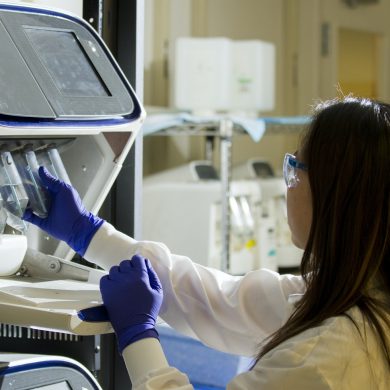By Haebin Liew | Blogger | SQ Online (2013-14)
If you could change one physical trait of yourself, what would it be? Set in the near future, Gattaca envisions a future where one’s genetic traits are determined through eugenics and feats of biological engineering. This gives rise to a highly hierarchical society, segregating the genetically inferior from the superior. The story revolves around Vincent Freeman, the genetically imperfect of two brothers, and his will to overcome genetic discrimination to achieve his dream of becoming an astronaut. However, I find the most important thing Gattaca illustrates is the incredible potential of defying natural selection and directing humanity towards a common objective rather than leaving our physical well-being to chance.
The movie touches upon a very interesting field that is actually gaining momentum in the research community. With the advent of stem cell research not too long ago and even our first hand at creating unique life, there is so much that Gattaca offers to what we can achieve next as scientists. I invited my friend Kunal Shah, a Computer Science major at USC, to share insight about the moral and biological implications of humans playing god in one of his favorite movies:
Me: Gattaca’s depiction of genetic engineering poses both moral and biological threats to the human condition. Do you think we should take advantage of such scientific breakthroughs if they were ever possible?
Kunal: It’s a pretty tough question to answer, and Gattaca definitely complicates the issue a bit. The scientific implications in Gattaca can’t help but stir the imagination of what could be for the human race in the future. Longer life expectancy, greatly reduced risk of disease, and better living conditions are a few of the benefits that would come out of taking advantage of such scientific breakthroughs. Yet would these breakthroughs be evenly distributed throughout the world? Would they reach the developing countries or stay confined within the first world? History tells us that the latter will occur. The gap in inequality in the world that exists today would be considered a minor crack compared to the fissure that would form if these scientific breakthroughs were pursued.
Me: Another issue that potentially goes against nature is our ability to cheat it now by creating structured life forms. By manipulating nature yet letting nurture still be a free variable, how do you think this will affect individuality and unique qualities from one person to the next?
Kunal: Nature and nurture go hand in hand by playing the cards you are dealt. By manipulating nature, nurture is effectively neutralized in that everything will be much more streamlined. Children are shaped to be who they are because of their shortcomings and troubles. Eliminating that aspect in a human being eliminates much of their personality that would be molded through their formative years. As a result, individuality as a whole would be minimized.
Me: It seems Gattaca portrays humans to be lab experiments, closely identifiable with bacterial colonies rather than autonomous beings. Do you think there is a relationship with our current mentality of using model organisms in labs and the need for a controlled, societal environment in Gattaca?
Kunal: Definitely. The so-called utopia in Gattaca is lifeless and soulless, as shown by the monotonous color scheme portrayed throughout the movie. There are few characters with an actual personality in the film. Model organisms are the norm in Gattaca’s world, leading to a singular and overall direction-less society as a whole.
A featurette from Gattaca that addresses the science behind the movie.
There is no telling how advanced in society and science we will come to achieving something as portrayed in Gattaca. Yet it is chilling to think that we have come so far in terms of improving the lives of millions and progressing to unforeseen circumstances as humanity. I hope in the coming decades we can all witness strides as great as Gattaca but perhaps in a less dystopic manner.

